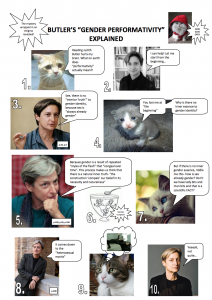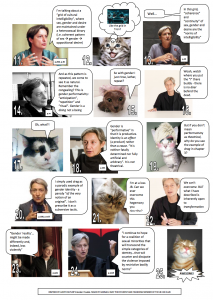When I first read the course syllabus, I was a bit concerned as to how a digital humanities project would come to fruition and was unclear as to what exactly it entails. The only thing I was able to imagine was the use of digital texts, on devices such as E-readers and tablets, and online research tools, through the library databases and online journals. However, once I began to examine my own social media sites, I began to notice the authors on Twitter that I was following and how memes are being used to explain theoretical topics using digital and popular media. “Is this digital humanities though?” I asked myself.
Most notably on my daily Twitter newsfeed, I see new blog posts, photos with fans and book tour publications from authors such as Chuck Palahniuk, known mostly for Fight Club. However, even though Palahniuk is one of my personal favorites, he is more widely recognized as a “fan’s author,” which often negates his “literary and academic potential.” In contrast to using social media to connect more personally with his readers, I also see authors such as Iván Thays, a Peruvian author whose 2008 novel Un lugar llamado Oreja de Perro portrays the aftermath of the Sendero Luminoso terrorist movement, not only connects with his readers but also uses Twitter to engage in more critical conversations with other authors. In comparing these two authors, even Thays’ twitter handle “@moleskinlit” shows the more pretentious, literary angle due to the popularity of the MoleSkin journals among writers.
Apart from social media, blogs and digital memes are also being created by students, professors, and activists, among others, to explain difficult, theoretical or political issues via photos and comedy. While not always accurate, these online texts are reaching large audiences via “retweets, likes and shares” that often closed conversations are being made more accessible to those whose professional lives may reside outside academia but still feel a passion or interest in engaging in a critical discussion.
Post-Structuralism Explained with Hipster Beards
Confused Cats against Feminism
But still, I ask myself, “Is this digital humanities?” Can these blogs gain enough merit to compete with scholars, and if this is the case, why should we continue studying within a formal setting? With online course and degree programs, will the digital humanities take place of the university classroom?
However, Dr. Baer’s in-class presentation highlights the benefits of producing knowledge through a digitized source because it allows scholars to collaborate without having to leave their home institution. Using filmed lectures and online discussion boards via Twitter handles, the scholars and students alike are able to engage in cross-cultural and cross-linguistic debates that will open the field to individuals who may not have access to traveling to conferences or attending presentations at other institutions. Through this presentation, I was beginning to answer the question of “What is digital humanities?” because it became clear that it is a combination of traditional scholarship with new technology, including Twitter, YouTube videos and video conferencing, among others. While I can see the benefits of incorporating digital media into a conference or classroom setting, I can’t help but think of the negative effects that will accompany such a change. Will conferences become a thing of the past? Will they all move to filming presentations and a subsequent, delayed Q&A session? Is it a utopic ideal to think that the humanities can function successfully via digital sources by removing the human element?
Now that the semester is coming to an end, I have a better understanding of what digital humanities consists, and following the group project, I have begun wondering if I will incorporate it into my own research. While I see the value of following online lectures, discussions and using multiple media outlets to engage and follow critical conversations, I’m not sure that I will fully commit myself to the digital humanities approach. On the one hand, it has taken about an hour to post this blog, trying to embed links and images, so maybe it’s just my unfamiliarity and lack of knowledge of new technology that is causing my apprehension. But, on the other, I find the human element to be an invaluable resource in the academic world. Having attended several conferences thus far, involving both graduate students and professors, I feel that meeting and engaging in intimate atmospheres and conversations has opened my mind to new avenues that I wouldn’t have considered previously within my own research. This semester, I attended the Midwest Popular Culture Association Conference in Indianapolis. My panel consisted of an advanced PhD candidate from Australia, who focused on the historical connection between Australia League Football and the gold rush, and a professor from Moorehead State University, whose specialty is in indigenous revolutions and contemporary hip-hop music in Africa, while I presented on the indigenous in Peruvian literature. Had our presentations been recorded and watched at different times, I don’t think it would have had as great of an impact as actually meeting these two individuals, discussing our different fields – Australia, Peru and Africa – while simultaneously identifying commonalities and offering suggestions.
So, am I sold on the digital humanities as the future of our field? Not necessarily. I do, however, see the value of incorporating it into our studies and am becoming more aware that I need to beef up my own personal technological skills if I want to stay relevant in the future.


Kayla–I really enjoyed this post on digital humanities. I admit I was definitely confused about the idea surrounding digital humanities upon first discussion of it in class. I agree with your final statement–that to “stay relevant” it’s probably best to keep up with this new idea. I think that even more so than staying relevant that the idea behind digital humanities is the push toward even more technology. While I might be partial to my physical books, I think it’s important to realize that we do live in a digital age, and that Twitter, Instagram, and blogs are where the future of academics lies, especially the humanities. I definitely don’t like that this is where we’re heading, but we need to jump on the bandwagon to stay up-to-date with where are respective fields are heading!